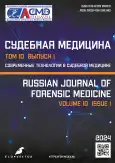Chipping pedophiles as an alternative to chemical castration
- Authors: Mukanov M.R.1, Begaliyev Y.N.2
-
Affiliations:
- The Kostanai Academy of the Ministry of Internal Affairs of the Republic of Kazakhstan named after Shyrakbek Kabylbayev
- Academy of Law Enforcement Agencies Under the General Prosecutors Office of the Republic of Kazakhstan
- Issue: Vol 10, No 1 (2024)
- Pages: 5-14
- Section: Original study articles
- URL: https://journal-vniispk.ru/2411-8729/article/view/254422
- DOI: https://doi.org/10.17816/fm15175
- ID: 254422
Cite item
Abstract
BACKGROUND: This study considers chipping of persons who have committed sexual crimes against minors as an alternative to chemical castration. The fact that the issue of punishment for crimes against sexual inviolability of minors is less prioritized than the issue of prevention of these crimes is confirmed by disappointing statistics.
AIM: To identify the advantages and disadvantages of chipping pedophiles in comparison with chemical castration.
MATERIALS AND METHODS: This study analyzed the current legislation of Kazakhstan on the issue of chemical castration and chipping of pedophiles. SWOT analysis was used to determine the positive and negative aspects of chipping in pedophiles.
RESULTS: Currently, the chipping of certain categories of citizens is illegal; however, there exists a legislative regulation of the use of electronic means of tracking suspects and convicted persons. Such means may well include biochips, and the expediency of enshrining chipping in criminal legislation as another coercive measure of medical nature has been substantiated.
CONCLUSION: Chipping is cheaper than chemical castration from an economic point of view and safer from a medical point of view. The only reason chipping remains inferior to chemical castration is the issue of legislative regulation and data security, the solution of which is a matter of time.
In conclusion, chipping pedophiles is a more effective and cheaper alternative to chemical castration. SWOT analysis showed the strengths and weaknesses of chipping pedophiles and the opportunities of this technology and potential threats to its use. Thus, the predominance of the strengths of technology over its weaknesses was revealed.
Full Text
##article.viewOnOriginalSite##About the authors
Malik R. Mukanov
The Kostanai Academy of the Ministry of Internal Affairs of the Republic of Kazakhstan named after Shyrakbek Kabylbayev
Author for correspondence.
Email: alik8385@mail.ru
ORCID iD: 0000-0002-4615-7666
SPIN-code: 2316-5222
Scopus Author ID: 57210157241
Dr. Sci. (Philosophical)
Kazakhstan, KostanaiYernar N. Begaliyev
Academy of Law Enforcement Agencies Under the General Prosecutors Office of the Republic of Kazakhstan
Email: ernar-begaliev@mail.ru
ORCID iD: 0000-0001-6659-8576
SPIN-code: 1929-3392
Dr. Sci. (Legal), Professor
Kazakhstan, KoshyReferences
- Voevodkin DV, Rustemova GR, Begaliev EN, et al. Identifying fake conclusions of forensic medical examinations using an artificial intelligence technology based on the experience in the Republic of Kazakhstan: A review. Russ J Forensiс Med. 2023;9(3):275-286. EDN: EFNJIE doi: 10.17816/fm8270
- Orakbaev AB, Kurmangali ZhK, Begaliev EN, et al. On the issue of using the results of a virtual autopsy in criminal investigation: A review. Russ J Forensiс Med. 2023;9(2):183-192. EDN: OEERGD doi: 10.17816/fm774
- Tursunov AB, Galickij FA, Begaliev EN, et al. Forensic and forensic aspects of childhood traumatism as a result of domestic injuries and traffic accidents: A review. Russ J Forensiс Med. 2023;9(3):299-308. EDN: ORUBFH doi: 10.17816/fm12389
- Prihod'ko IS. Improving the activities of internal affairs bodies of the Republic of Kazakhstan on the prevention of sexual offences committed against children. In: Science of Young 2022: Collection of articles of the III International Research Competition. Part 2. Petrozavodsk; 2022. Р. 137-147. EDN: WUHBOI
- Alikperov HD. Global remote crime control: acceptability, opportunities, costs. Criminology: yesterday, today, tomorrow. 2016;(3):26-33. (In Russ). EDN: WWRTDB
- Wang Y. A review of microchip implant in human. In book: Proceedings of the 2022 6th International Seminar on Education, Management and Social Sciences (ISEMSS 2022). 2022. P. 92-97. doi: 10.2991/978-2-494069-31-2_12









